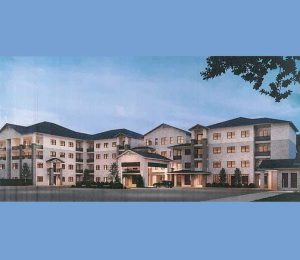A conditional use permit for the BelAir transitional home in north Coweta was approved unanimously Feb. 16, but not without much discussion and 36 conditions being imposed before the home can be re-opened.
“I’m extremely torn,” said Commissioner Randolph Collins during the discussion, acknowledging that the need for such a facility exists in Coweta County. “This is one of the hardest decisions I’ve had to make. It’s an issue of trust to see if (BelAir) will do what you say.”
Commissioner Tim Lassetter also during the discussion reiterated the concerns of commissioners and a number of neighbors that questioned whether the home was able to meet the conditions.
The number of conditions placed on the facility prior to its re-occupancy were massive and included some operational changes. Perhaps as significant as any of the conditions was the resident maximum of 24 women and children. BelAir attorney Judy O’Brien told commissioners that the facility, based on comments from the Jan. 19 meeting, would exclude males from residing at the home. The presence of men, including those walking along area streets, had been cited by some neighbors as a potential safety concern for their families. No mention was made by either BelAir representatives or commissioners on the consequences of potentially having to split up homeless families that would otherwise have helped populate the facility.
Former BelAir resident Vernon Robertson addressing commissioners during the public comments portion of the meeting explained that he had recently undergone heart surgery and had resided at BelAir because he had no family.
“I have no where to go since men can’t be there anymore,” Robertson said to commissioners, noting that he felt safe at the home while waiting for his social security provisions to be made. “Whoever helped put me under the bridge, thanks.”
Among the other conditions was one that stipulated that all occupants submit to drug and criminal background checks and that no one with a history of domestic violence or sexual offenses be allowed to reside there.
But many of the conditions agreed to by BelAir dealt with health, safety and food service issues. Commissioners at the Jan. 19 meeting had noted the facility’s past history of fire calls and an investigation by the fire marshal as two of their concerns. Collins cited fire inspection violations such as the use of kerosene heaters by some residents and the presence of some of those items still on the premise when he visited the facility.
O’Brien Jan. 19 had noted that the violations from 2009 had been corrected and that the facility was in possession of a 90-day certificate of occupancy issued in December. O’Brien on Feb. 16 said BelAir was retaining the services of a fire safety consultant to make sure the facility “walks the straight and narrow.”
One of the conditions pertained to a residency requirement. The condition stated that all residing at the transitional home must be verified residents of Coweta County prior to admission. County attorney Jerry Ann Conner during the discussion noted a comment at the previous meeting that would have permitted residency to those who had ties to Coweta such as former residents that had moved away and were attempting to relocate here, as was the case with a former resident who spoke in January. That addendum was not part of the motion made later in the meeting.
And as with the meeting in January, the significant number of people making public comments was split. Residents of the home, former residents and community professionals dealing with homeless issues were in favor of the board granting the conditional use permit. Neighbors and those living in the area largely opposed the approval, saying they were not opposed to the need for a transitional home in Coweta. They centered their comments on the belief that such a home was not appropriate in a rural area.










Leave a Comment
You must be logged in to post a comment.